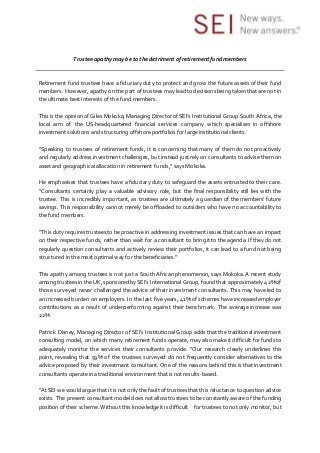
SEI . Trustee apathy may be to the detriment of retirement fund members ...
- 1. Trustee apathy may be to the detriment of retirement fund members Retirement fund trustees have a fiduciary duty to protect and grow the future assets of their fund members. However, apathy on the part of trustees may lead to decisions being taken that are not in the ultimate best interests of the fund members. This is the opinionof Giles Mokoka, Managing Director of SEI's Institutional Group South Africa, the local arm of the US-headquartered financial services company which specialises in offshore investment solutions and structuring offshore portfolios for large institutional clients. “Speaking to trustees of retirement funds, it is concerning that many of them do not proactively and regularly address investment challenges, but instead just rely on consultants to advise them on asset and geographical allocation in retirement funds,” says Mokoka. He emphasises that trustees have a fiduciary duty to safeguard the assets entrusted to their care. “Consultants certainly play a valuable advisory role, but the final responsibility still lies with the trustee. This is incredibly important, as trustees are ultimately a guardian of the members’ future savings. This responsibility cannot merely be offloaded to outsiders who have no accountability to the fund members. “This duty requires trustees to be proactive in addressing investment issues that can have an impact on their respective funds, rather than wait for a consultant to bring it to the agenda. If they do not regularly question consultants and actively review their portfolios, it can lead to a fund not being structured in the most optimal way for the beneficiaries.” This apathy among trustees is not just a South African phenomenon, says Mokoka. A recent study among trustees in the UK,sponsored bySEI’s International Group,foundthat approximately 42%of those surveyed never challenged the advice of their investment consultants. This may have led to an increased burden on employers. In the last five years, 41% of schemes have increased employer contributions as a result of underperforming against their benchmark. The average increase was 22%. Patrick Disney, Managing Director of SEI’s Institutional Group adds that the traditional investment consulting model, on which many retirement funds operate, may also make it difficult for funds to adequately monitor the services their consultants provide. “Our research clearly underlines this point, revealing that 59% of the trustees surveyed do not frequently consider alternatives to the advice proposed by their investment consultant. One of the reasons behind this is that investment consultants operate in a traditional environment that is not results-based. “AtSEI we wouldargue that it is not only the fault of trustees that this reluctance to question advice exists. The present consultant model does not allow trustees to be constantly aware of the funding position of their scheme. Without this knowledge it is difficult fortrustees to not only monitor, but
- 2. also challenge, their advisors. It seems clear that a more accountable advisory model is needed where fees are based on results and the trustee board is able to clearly track the funding level against the fund’s goals.” The effect of non-optimal asset and geographical allocation is especially amplified over a long period, such as with retirement funds with an investment horizon of 20 to 30 years. Over the years, one of the areas that has often been neglected in portfolio construction, is offshore allocation, says Mokoka. “Some of the trustees I speak to cannot remember the last time they undertook a full, in-depth review of their offshore assets.” He believes the decision to take money offshore should not just be done on the basis of currency movements at a certain time, but rather viewed as a crucial strategic geographical allocation thanks to the long-term diversification benefits of offshore assets. ENDS About SEI Investments South Africa: SEI founded its South African business in 1995 and has an established office in Melrose Arch, Johannesburg, offering a fully staffed team with wide-ranging expertise. Sinceits first mandate in 1997,SEI has met the needs ofSouthAfrican offshore investors. Through the Manager of Managers program, SEI helps meet the needs of clients looking for a world-class partner with the resources and experience to add value to their global investment strategies. Issued by: H+K Strategies South Africa Tel: +27 11 463 2198 Email: craig.atherfold@hkstrategies.co.za SEI contact: Giles Mokoka Managing Director SEI South Africa